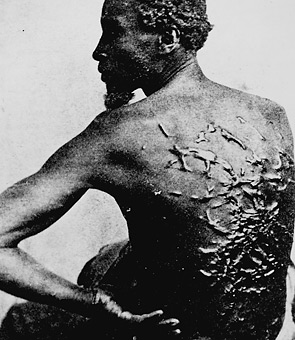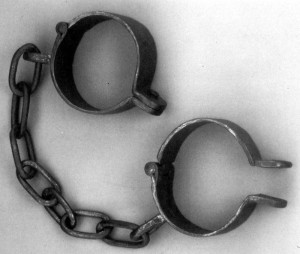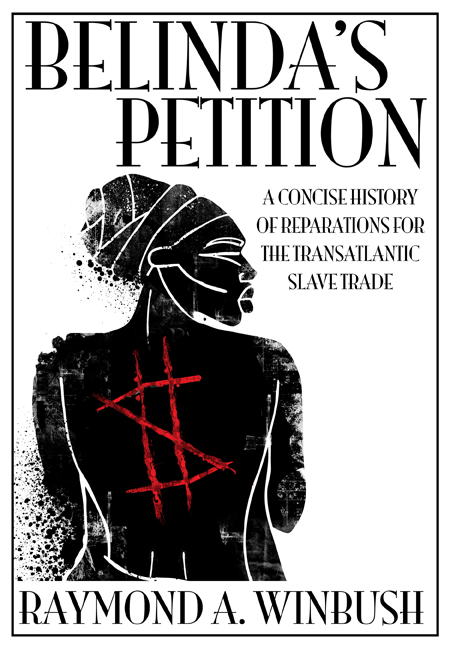That, above, is the startling cover for colleague Ray Winbush’s new book, Belinda’s Petition: A Concise History of Reparations for the Transatlantic Slave Trade. (In the spirit of full disclosure, I wrote a blurb for the book.) Jerome Thompson, a staff artist at The Atlanta Journal-Constitution, fashioned the kiloword-saving graphic, no doubt inspired by this famed photo of a Maryland slave, below right.
 Belinda was an 18th century African woman, kept captive as a slave on the Ten Hills Plantation in Medford, Massachusetts. In 1782, explains Winbush, she
Belinda was an 18th century African woman, kept captive as a slave on the Ten Hills Plantation in Medford, Massachusetts. In 1782, explains Winbush, she
petitioned the state legislature for reparations, for her 50 years of captivity and unpaid labor by her former owner, Isaac Royall. … He was a British Loyalists and fled the country to Nova Scotia soon after the Amerikkkan Revolutionary War started and left 27 “slaves” on the plantation by themselves. Belinda’s daughter, whom I surmise was Royall’s child, petitioned the Massachusetts State Legislature for a “pension derived from the great wealth” she had helped Royall accumulate. She asked for money (reparations) for her and her daughter AND THEY GAVE IT TO HER!
Winbush says he “had to” do the book, because, as editor of the 2003 anthology, Should America Pay? Slavery and the Raging Debate on Reparations, “every time I speak on reparations, someone in the audience asks a question about [its] history. I wanted a book more readable than Should America Pay?, but [one that] would retain the scholarship so that it would sell inside and outside of the academy.”
The little-known story of Belinda, he notes, pushes back the beginnings of Black redress as a phenomenon, and the origins of the reparations movement in the United States, more than 80 years before their previously reckoned date of 1865. That year marked both the signing of the Emancipation Proclamation, which legally ended U.S. slavery, and the issuance of Special Field Orders, No. 15, which would have given thousands of freed Africans forty acres of Southern land, apiece. (President Andrew Johnson, the Southerner who followed the assassinated Linclon, nullfied the order.)
 Thus, says Winbush, the critical reason he wrote about Belinda’s petition is to “rescue her from white revisionists who will see this as an act of ‘feminist derring do,’ rather than an act of compensation for her enslavement.” To him, the “story of her captivity, enslavement and liberation is an incredible tale of resilience during a time when Africans in America were seen as something a little more valuable than livestock.” Wow: When you put it that way, it’s almost like her being set free twice.
Thus, says Winbush, the critical reason he wrote about Belinda’s petition is to “rescue her from white revisionists who will see this as an act of ‘feminist derring do,’ rather than an act of compensation for her enslavement.” To him, the “story of her captivity, enslavement and liberation is an incredible tale of resilience during a time when Africans in America were seen as something a little more valuable than livestock.” Wow: When you put it that way, it’s almost like her being set free twice.


5 comments ↓
Why make the context of Belinda’s story an either-or proposition? Her petition for reparations is both an act of ‘feminist derring-do’ and an act of ‘compensation for her enslavement.’ Understating the gender issues in her legal battle to make greater the racial issues does not free her twice; it just belittles the totality of black women yet again.
Like Alice Walker, I distinguish between “feminist” and “womanist”, with the latter, Walker’s preference, considering gender AND race, is absent from the “feminist” perspective.
Belinda’s story is a *womanist* story and not a “feminist” tale which it has been. White men and women have been the primary chroniclers of Belinda, save for Rita Dove’s poem on her. I’m just trying to have Belinda speak for herself rather than white folks speaking for her…
If Belinda had been white she would not have been enslaved. Race supercedes fiercely, and as a woman, she was given attention because she was not a Black man. White women cannot lay claim to every womans’ story, some belong first and foremost in the category of race, be it Black, Native American, Latina, or Asian.
this raises the question once again of which comes first; race or gender? if you had to choose one to give up 1st, which would it be? it would be my preference to retain my manhood albeit my pleasure to be a black man.
a team is being assembled HATER’S BEWARE! on August 1, 2009, The Official, Universal, Exclusive and Inaugural HATER’S DAY. coming soon hatersday.com tell a freind better yet tell HATER. direct all stories inquiries and comments to hatersday@gmail.com
i’m off,
genius khan
http://www.thepetitionsite.com/1/haters-day
Leave a Comment